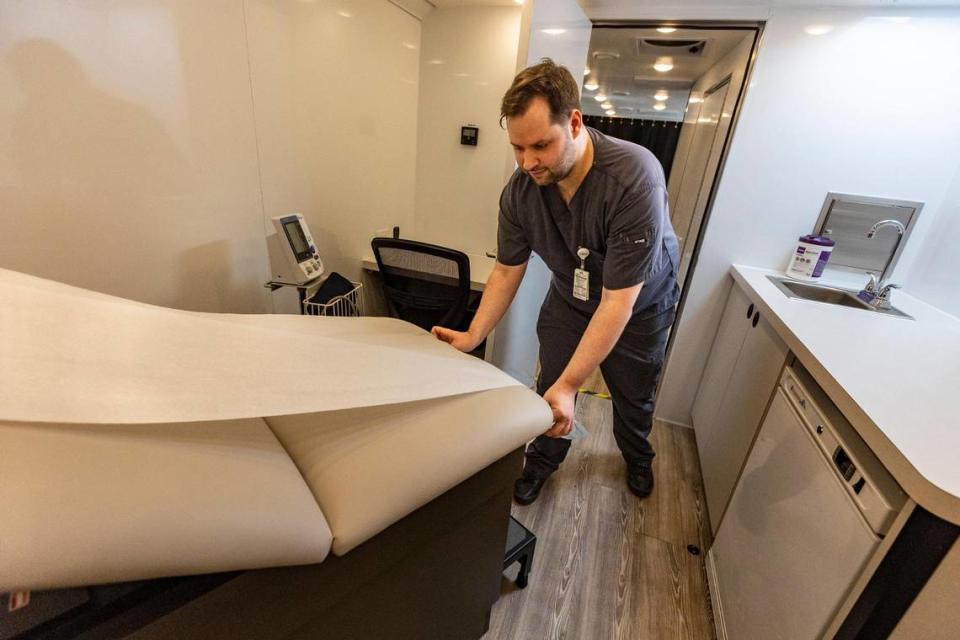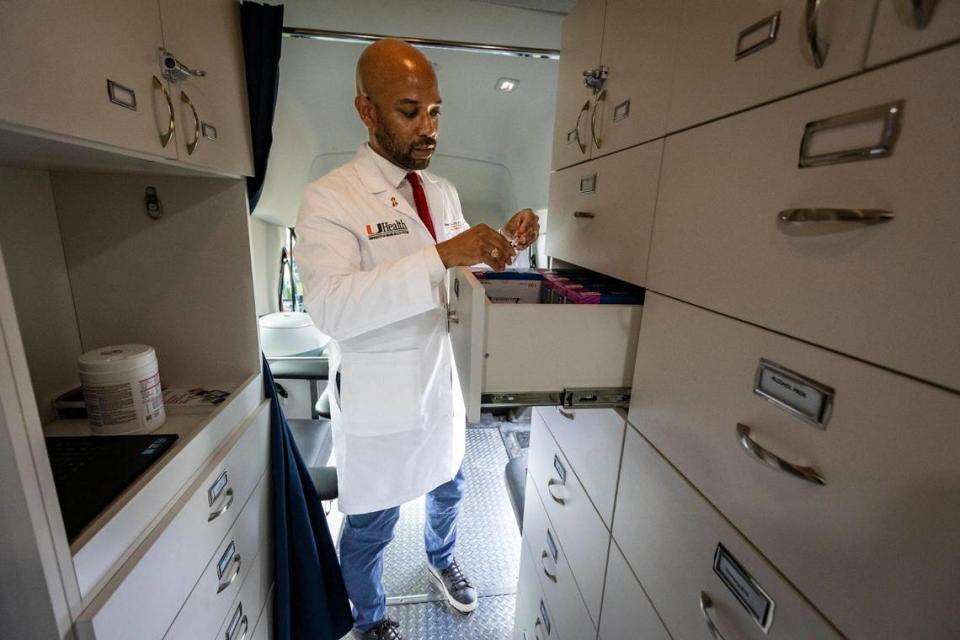Parts of Miami and Fort Lauderdale have high HIV rates. How a clinic on wheels can help
HIV cases in South Florida are among the highest in the United States, with the virus prevalent across parts of Miami, Miami Beach, North Miami and Fort Lauderdale.
More than 50,000 people live with HIV in Miami-Dade and Broward counties, state health department data show. In 2022, there were 1,088 new HIV diagnoses in Miami-Dade and 607 in Broward, continuing a trend of rising case counts.
For several years, University of Miami doctors have used mobile clinics to bring HIV testing, treatment and PrEP — a medication used to reduce the risk of getting HIV — to neighborhoods that have high rates of people with HIV to help reduce spread of the virus.
Now, they’ll be doing research on wheels.
“We want to go out in the community and let the community know of what research studies are ongoing in terms of both treatment and prevention, as well as understanding how it’s affecting our community,” said Dr. Maria Alcaide, an infectious disease professor and director of clinical research at the University of Miami Miller School of Medicine.
The new mobile research van, CONNECT, will let UM expand outreach in other areas of South Florida seeing a rise in HIV infections, including North Miami and Broward County. The goal is to make it easier for people to participate in HIV studies. One of those studies seeks to understand and reduce the impact of chronic health conditions in people living with HIV. Another is recruiting women 18 to 45 who are living with or at risk for HIV, and may be pregnant.
Alcaide said the mission is to make sure people being studied are “highly representative of our community,” which in turn, should lead to better prevention and treatment. Research participants also get HIV care for free.

Learning about HIV prevention
One challenge doctors face is finding ways to teach people about the importance of HIV prevention, testing and treatment. That sometimes means thinking outside the box, like hosting yoga classes that include an HIV prevention talk.
“We do dance contests, we play HIV jeopardy, we have high school kids come out, learn about HIV and then we do presentations for the seniors in their community or the adults in their community ... so we’ve been able to really find these nuanced pathways to keep the community engaged,” said Dr. Sonjia Kenya, director of the Miller School’s of Medicine’s Community-Based HIV Awareness for Minority Populations, or CHAMP program. The work focuses on improving HIV outcomes in Miami-Dade’s underserved communities, such as Liberty City, which was the HIV epicenter of Miami-Dade before the COVID-19 pandemic and still has a high prevelance.
The doctor is hoping to eventually get enough funding to expand into Broward. CHAMP is also working with the U.S. Virgin Islands to launch a new program in the territory.
Expanding access to HIV testing and PrEP is also key, according to Care Resource Community Health Centers, which for decades has worked to address the HIV epidemic in Miami-Dade and Broward counties.

Care Resource, which earlier this month ranked nationally as one of the best centers in the country for HIV prevention and care, has expanded its telehealth services for HIV to help improve access to care and reduce “stigma-related delays” that could stop someone from seeking care.
“Transportation issues are a common barrier to care for HIV and behavioral health, yet this barrier may be eliminated when one has the option of an appointment from their home,” Care Resource told the Miami Herald in an email. “Using an online format may also help increase the availability of convenient appointment times and broaden access to care for those living in areas that are further away.”
Some of the health center’s recent initiatives include an at-home HIV testing program for people in Miami-Dade and Broward who have not previously tested positive for HIV or have been tested within three months. Another initiative, PrEP@Home, lets people schedule a telehealth appointment with a provider, complete all required lab testing at home, and have the pre-exposure prophylaxis (PrEP) medication delivered to their home.
HIV rates in Miami-Dade and Broward
Here’s what to know about HIV in South Florida:
▪ More than 50,000 people live with HIV in Miami-Dade and Broward counties, state health department data show.
▪ Florida is in the Top 5 of states with the highest rates of HIV, as well as in the total number of cases, according to recently released 2021 data collected by AIDSVu, a website that visualizes and gathers HIV data across the country.
▪ Miami-Dade ranks No. 4 and Broward No. 8 for total HIV cases by county, according to AIDSVu.
▪ If you look at HIV rates by county, Miami-Dade ranks No. 17 in the country, with 1,190 people diagnosed with HIV per 100,000 people. Broward sits at No. 14, with 1,236 people diagnosed with HIV per 100,000 people.
▪ In 2022, there were 1,088 new HIV diagnoses in Miami-Dade and 607 in Broward, a 0.37% and 3.76% increase in HIV diagnoses, respectively, in the last five years, 2018 to 2022, experts say.
What are the HIV hot spots in South Florida?
A yearly HIV/AIDS survey on needs is conducted for the county through an advisory board called the Miami-Dade HIV/AIDS Partnership. As part of this assessment, data are analyzed to determine which neighborhoods have the highest prevalence of HIV.
The HIV hot spots in Miami-Dade, with more than 886 cases per ZIP Code of residence, are 33147, 33142, 33139 and 33161, according to the September assessment. These include Miami-area neighborhoods Brownsville, Allapattah and West Little River, as well as South Beach and North Miami.
There’s also a high number of people living with HIV in El Portal, Little Haiti, Little Havana, Liberty City, Miami Gardens, Miami Shores, Overtown and North Miami Beach, according to a Care Resource analysis of HIV data.
In Broward County, some of the areas with the highest prevalence of HIV include Fort Lauderdale, Hollywood, Sunrise, Dania Beach, Lauderhill, Oakland Park, Plantation, Tamarac and Wilton Manors.
HIV resources
▪ To learn more about the services offered by Care Resource Community Health Centers, visit careresource.org.
▪ To check the schedule’s for UM’s Rapid Access Wellness Clinic, which provides a variety of services including STI and HIV testing, and PrEP, follow them on Instagram @mobileprep, on Facebook, or visit umiamihealth.org/treatments-and-services/infectious-diseases/uhealth-rapid-access-wellness-clinic. To schedule an appointment, call 305-243-2584.
▪ To find an HIV test provider near you, visit gettested.cdc.gov
▪ To find a provider near you that offers PrEP, visit preplocator.org/

